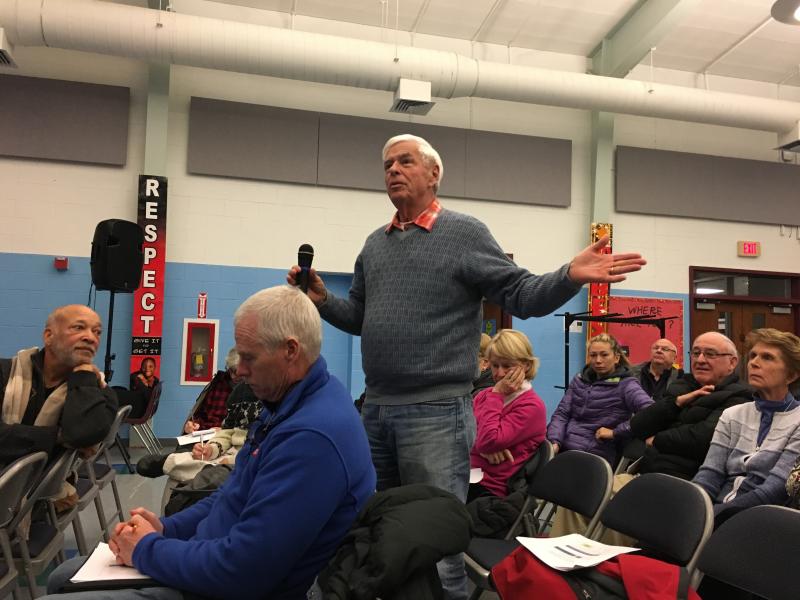Residents speak out on marijuana sales
While some Mattapoisett residents support an outright ban of recreational marijuana sales in town, others told officials at a Planning Board hearing on Monday to embrace the increased tax revenue the town could see by allowing dispensaries to set up shop.
Though more public meetings will be had before moving forward, residents and town officials agreed a moratorium on sales until the end of next year might be the best option because it will give officials time to determine how to proceed.
Municipalities are in limbo, as there are currently no state regulations in place for the sale of recreational marijuana, which voters approved at the ballot in November of 2016. Without knowing how the state will regulate the retailers, it’s tough for governments to draft bylaws regarding local sales, Attorney Katherine Laughman explained.
Further complicating the situation is a tight timeline. The state has a March 15 deadline to get its regulations in place. On April 1, retailers will be able to apply for licenses to sell marijuana.
If there is no local bylaw in place by April 1 indicating otherwise, dispensaries could open up in any area zoned for retail, which Mattapoisett officials are hoping to avoid. But a bylaw regulating where dispensaries could operate would have to be approved by Town Meeting voters, and with the next regular Town Meeting scheduled for May, the town will either have to risk going without a bylaw or call a special Town Meeting prior to April 1.
In 2016, Mattapoisett voters were split in the vote for legalization. Of the 4,225 responses to the ballot question, the “no” vote prevailed by just 134. That split was evident again on Monday as officials and residents considered whether or how to regulate sales of the drug.
“The town, I believe, has spoken when we voted ‘no’ to have marijuana in the state, nevermind our town,” Dawn Smith said. “I think the Planning Board should take that as an indication of how we feel.”
Resident Karen Hay said she didn’t think outright banning sales would work.
“I think we need to look at the prohibition [of alcohol],” she said. “It didn’t work. Ronald Reagan’s war on drugs obviously has not worked. For a long time I was anti-legalization, but with my old age comes, I hope, some wisdom. Legalize it, control it, tax it, do something good with the tax money. It’s like alcohol. You’re not going to stop it.”
Resident Don Bamburger argued that the town should embrace marijuana sales for the sake of increased tax revenue.
Municipalities will be able to impose as much as a three percent sales tax on marijuana sales, according to Laughman.
“We can embrace it or keep it out, and keeping it out just hasn’t worked historically,” he said. “My thought would be we embrace it, regulate it, control it. You’re not going to stop it, so embrace it and get tax revenue.”
Liz Brown agreed with those in favor of regulating rather than banning. She reminded attendees that recreational marijuana is already legal for people to possess.
“We should be more concerned about retail service,” she said. “It’s going to be in our community, we might as well take the option to tax it and control it.”
Some residents worried that the revenue from marijuana sales would not be as lucrative as people imagine.
“Colorado did not get the revenue they thought they would,” Don DeMello said. “The black market cut their street costs, so that element is still there.”
Many town officials said they would favor implementing a moratorium on marijuana sales until Dec. 31, 2018. That would buy them time to come up with a bylaw that could be approved at Town Meeting in May or November.
Selectman Tyler Macallister noted: “I don’t want to have done nothing by April 1.”
Police Chief Mary Lyons agreed.
“We should have a moratorium and let voters vote,” she said. “We need to take a good look at Colorado…The Commonwealth is not prepared. We should slow down a little bit, the right info should be gathered and the proper steps should be taken. It’s just common sense.”
The moratorium will also have to be approved by Town Meeting voters -- and prior to the April 1 deadline if the town wants to avoid retailers applying to sell under the current bylaw.
Elsewhere in the tri-town, Rochester voters already voted to approve a moratorium at the May Town Meeting. Town attorney Blair Bailey said at the time that a moratorium made the most sense because it would give the state a chance to come up with its own regulations. Then, the Rochester Planning Board could draft its only bylaws based on those.











